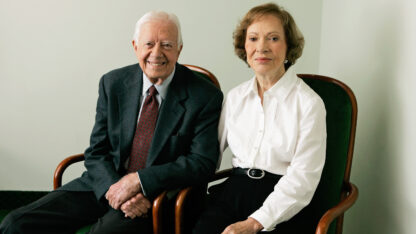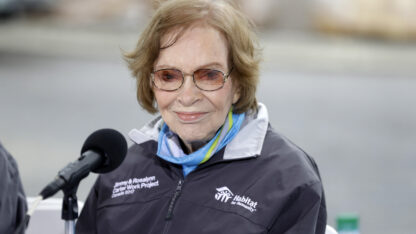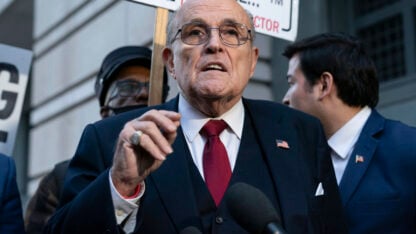Linda Campbell decorated the Lions Club Christmas tree in her small hometown just as she would any other Thanksgiving week, but this was no ordinary Monday in late November.
All around the town of Plains, neighbors mourned the death of their matriarch, former U.S. first lady Rosalynn Carter, while worrying about their patriarch, former President Jimmy Carter.
“We’ve prayed for them every day for a long time,” said Campbell, 75, as another lifelong Plains resident, Lee Johnson, lowered the U.S. and Georgia state flags that fly in front of the downtown commercial district.
Rosalynn Carter died at home Sunday after her physical health declined rapidly as she lived with dementia in recent months. She was 96. The former president, who is 99, has been in home hospice care since February.
It was not immediately clear Monday whether Jimmy Carter will be able to attend the public services for his wife next week in Sumter County and Atlanta.
For months, townspeople anticipated losing him first. Now, with Rosalynn’s death, they and the extended Carter family are embracing the opportunity to celebrate a woman who was so often defined by her husband but who carved her own path locally and globally.
“She was an incredibly humble person — the epitome of grace,” said Tim Buchanan, a cousin of Rosalynn’s whose mother remained close to her throughout her life. “Her fingerprints are on things all over this community.”
Jill Stuckey, a close friend of the Carters since she moved to south Georgia in the 1990s, called the couple “the lifeblood of Plains,” a town of 600 or so. That’s about the same size as when the future president and first lady were born here in the 1920s, wed here in 1946 and ran his presidential campaign out of the old Plains train depot in 1976.
“It was awesome to see the two of them do all those things,” recalled Campbell, who grew up with the Carters’ eldest children. “It was exciting here, too. When they were in the White House, we had tour buses of people from all over the world coming to see where Mr. Jimmy and Ms. Rosalynn came from.”
Perhaps more surprising than a presidential couple emerging from such a small place is that they came back after Jimmy Carter’s 1980 defeat, returning to the same house they lived in when he was first elected to the state Senate in 1962.
“I was surprised a little bit as an 18-year-old wondering why,” said LeAnne Smith, Rosalynn’s niece, who still lives in the home where her aunt grew up. Smith figured they’d “at least go to Atlanta,” where they opened The Carter Center for their post-White House humanitarian work and advocacy for democracy.
“In the long run,” Smith said, “I think that coming back and living here was, you know, their sanctuary and their peace place and their place to rest and enjoy being home.”
Disappointed and even depressed over their early exit from Washington, the Carters dived back into local life. They joined Maranatha Baptist Church, where Rosalynn Carter’s final funeral will be held next Wednesday, Nov. 29, after having been members of Plains Baptist Church for most of their marriage.
Campbell, who attends church in nearby Americus, noted that Rosalynn was instrumental in establishing a community-wide Thanksgiving food distribution, led by the Maranatha congregation. The latest annual event was held the same weekend Rosalynn died.
On Sunday evening, hours after her death, many community members gathered at Plains Methodist Church, where Rosalynn grew up and where the Carter were married, for the Thanksgiving week service.
“We had more than 400 people get food,” Campbell said. “She would have been proud.”
Jeff Campbell, who helped his wife Linda decorate the downtown Christmas tree, recalled his years working for the National Parks Service that maintained the Carter historic sites and their residential property that will one day become part of the public exhibits.
“She was always very gracious,” he said, though he laughed about her exacting standards for how the properties appeared.
“We sometimes would have a new guy who thought he knew better than Ms. Rosalynn,” Campbell said, noting that Rosalynn was an accomplished gardener herself. “I’d tell him, ‘You do this the way Ms. Rosalynn wants it and everything will be fine.’”
Stuckey said Rosalynn always balanced life as a global figure, traveling to dozens of countries as part The Carter Center’s work, with being an eager participant in small-town life.
“I’d hear somebody coming in and it would be President and Mrs. Carter out for a walk,” Stuckey recalled. “Mrs. Carter sometimes would come by herself and, you know, just want to know what’s going on in the town. They’d have been away for a while and wanted to catch up on how everybody is doing.”
As deep as the Carters’ family and community ties go in Sumter County, Rosalynn did not distinguish between lifelong residents and those who came to Plains later.
Phillip Kurland has been in Plains about 30 years — less than a third of Rosalynn Carter’s life span. He and his wife opened a political memorabilia shop downtown.
“They’d both come in” while on their regular walks or bike rides, he said. The former president would always greet customers, “but she would want to stay and have real conversations with everybody.”
Andrea Walker, another Plains transplant, befriended the Carters when she and her late husband built a house that bordered on “the Carter compound,” as the locals call it.
Rosalynn found ways around the entrapment of six-foot fencing and Secret Service protection, slipping out at times without the agents knowing, Walker recalled. “She would jump in her golf cart, come over, kind of do the knock and walk-in,” she said. Other times, agents would give the neighbors a heads up.
“We’d start pouring her margarita; we knew that’s what she wanted,” Walker said. “She was just coming out of the pool right to her frozen rocks.”
It’s obvious in Plains that “everything is named after Jimmy,” but Buchanan said “we’re making progress” on establishing more of an official presence for Rosalynn. Along with markers outside outside her childhood garden and the old Smith home where LeAnne Smith still lives, a “Butterfly Trail” includes small gardens around the town, a nod to the former first lady’s love of butterflies.
Because the former first lady – and eventually the former president – will be buried in Plains, there will always be a draw for outsiders who help support the town Jimmy and Rosalynn Carter made famous, townspeople said.
Said Stuckey: “They were thinking about economic development of Plains and tourism even in their deaths.”








